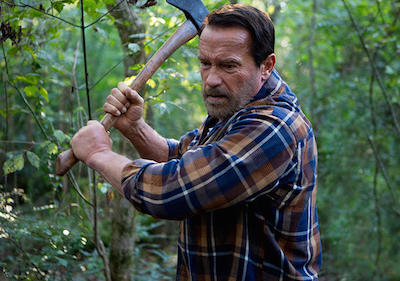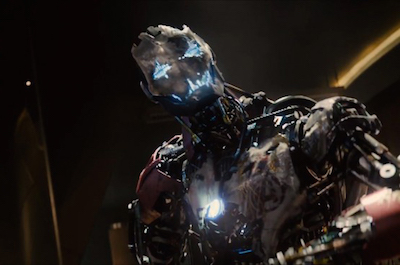 In Maggie, Arnold Schwarzenegger has a teenage daughter who’s a zombie. Not the usual, comatose-on-the-couch, waiting-for-a-boy-to-call zombie, but a zombie zombie–a victim of the “necro-ambulatory virus,” which, having ravaged our cities, is burning through the heartland, killing all plant and animal life and transforming infected humans into the undead. “Get to the chopper?” More like: “Get the chopper!”
In Maggie, Arnold Schwarzenegger has a teenage daughter who’s a zombie. Not the usual, comatose-on-the-couch, waiting-for-a-boy-to-call zombie, but a zombie zombie–a victim of the “necro-ambulatory virus,” which, having ravaged our cities, is burning through the heartland, killing all plant and animal life and transforming infected humans into the undead. “Get to the chopper?” More like: “Get the chopper!”
A chopper, of the kitchen implement kind, is wielded during Maggie, but not by Arnold. Since his stint as the “Governator” of California ended, the muscleman-turned-actor-turned-superstar-turned-politician has been doing good work in movies, not that you’ve seen Escape Plan, with his action contemporary Sylvester Stallone, or his full-throttle modern Western The Last Stand. And you probably won’t be
seeing Maggie, either, at least, not on the big screen, where I saw it in advance of a limited run in theaters that begins on Friday. The one-time biggest star in the universe is now VOD.
It’s worth your few bucks, though its widescreen images, in desaturated “apocalypse” browns and grays, won’t read as well on your iPad or phone as they did onscreen. What will pop is its star’s understated performance. In a role that could have been played by Harrison Ford or Kevin Costner, the 67-year-old Schwarzenegger gives a tender performance as Wade, a Midwest farmer. It’s not a stretch to imagine him as the son of good immigrant stock, tilling the soil, but we’re far from Norman Rockwell’s America. After an unwise trip into a decaying Kansas City, his daughter Maggie (Little Miss Sunshine Oscar nominee Abigail Breslin) is bitten by one of the infected. On The Walking Dead and in the majority of zombie movies, the effects of this are pretty much immediate, and moral choices tend to be trumped by quick demolition of the cranium. Here, however, it takes up to eight weeks for a victim to “turn” (an event presaged by the unfortunate’s inability to smell anything other than meat), and doctors release them into the temporary care of their loved ones, before state quarantine and a final sendoff via painful lethal injections as they go full cannibal. Some families refuse to bring out their undead, with disastrous consequences, and the local police maintain order with a heavy hand.
Wade’s attempts at domestic tranquility are tested by a beloved child who is literally falling apart before his eyes. We never do find out why Maggie trekked to the city, but we can guess that it had something to do with the traumatic death of her mother. Maggie is uneasy around Wade’s second wife, Caroline (Joely Richardson), who, uncomfortable in turn, sends Maggie’s half-siblings off to relatives as they await her fateful degradation. A scene in a doctor’s office, as fellow patients shrink from Maggie, reminded me of an experience I had 30-odd years ago, as physicians tried to calm a panicked AIDS patient in an adjoining room. Everyone remained calm and “professional,” but in the plague years of the illness, uncertainty, suspicion, and discomfort silently exacerbated the situation.
 Most of Maggie is like this, as human life tries to negotiate with undeath. There’s little zombie “action,” in a film closer in spirit to the British TV show In the Flesh than anarchic horror movies, and the ironic black humor of the show has also been stripped away. Directed by Henry Hobson (a veteran of title design who is also credited with the visual design of the film’s practical makeup effects), from a long bubbling script by John Scott 3, the movie does have its social commentary side, as doctors balance family care and the public good. Looked at one way, the movie might be considered pro-“vaccine choice,” but these themes aren’t stressed. Mostly Maggie focuses on the awkward interaction of father and daughter as they relive happier times and visit flower beds on the farm, the kind of thing that prime Arnold, and the prime Arnold audience, would never have countenanced. (I can’t recall a single daisy in any of his old hits, except maybe the flora annihilated by nukes in T2). In a poignant scene Maggie and a stricken boy, on the town with friends who are doing their best to keep things light, enjoy a last embrace.
Most of Maggie is like this, as human life tries to negotiate with undeath. There’s little zombie “action,” in a film closer in spirit to the British TV show In the Flesh than anarchic horror movies, and the ironic black humor of the show has also been stripped away. Directed by Henry Hobson (a veteran of title design who is also credited with the visual design of the film’s practical makeup effects), from a long bubbling script by John Scott 3, the movie does have its social commentary side, as doctors balance family care and the public good. Looked at one way, the movie might be considered pro-“vaccine choice,” but these themes aren’t stressed. Mostly Maggie focuses on the awkward interaction of father and daughter as they relive happier times and visit flower beds on the farm, the kind of thing that prime Arnold, and the prime Arnold audience, would never have countenanced. (I can’t recall a single daisy in any of his old hits, except maybe the flora annihilated by nukes in T2). In a poignant scene Maggie and a stricken boy, on the town with friends who are doing their best to keep things light, enjoy a last embrace.
A few weeks ago I tried to get a review together of True Story. I got off a good line (“In True Story, James Franco haunts a writer, which I can relate to, as all I seem to do anymore is review James Franco movies, plays, and ‘projects'”), then stopped, as the movie was suffused with an atmosphere of dread and nothing else. I mean, nothing happened, and not a Seinfeld “nothing,” either. Some will feel the same about Maggie, whose trailer excited some interest, and there were titters once the screening ended. After 90 minutes of glum apoca-realism, the filmmakers go for a more transcendent ending. It didn’t feel right, somehow evasive. But, thinking it over, the movie is called Maggie, and not Wade, and the star is as much an observer of Breslin and her warm-hearted, cold-blooded performance (she was also in Zombieland) as he rides shotgun (so to speak) as a participant. Schwarzenegger will revisit former glories with the questionable Terminator movie and maybe a Conan sequel (which I would like to see); watching him breathe new life into an aged career gives this entrant into an unkillable genre some of its interest.
 After a day or two in release you can’t really review Avengers: Age of Ultron. The elephant in the megaplex takes over the Internet as swiftly as the title entity does in the movie and all you can really do is comment on the thing as it swamps social media. After the relatively swift-footed Avengers this is a slog, with that pallid, Man of Steel look, enlivened every so often with an offhand quip or bit of business, almost all of which are spoiled before you head out to the theater. If you haven’t seen it yet, chances are you’ve already read about director Joss Whedon leaving Twitter over this or that outrage, including feminist backlash, if that’s the way it went down. (Stories change rapidly.). My two pixels: biting the hand that feeds her, Scarlett Johansson already took on the limp rom-dram aspects of Black Widow via SNL, forced female sterilization and other indignities to women are part of the world beyond coast-based media outlets that will also see the movie, and maternity is, you know, a universal subject. I have yet to read 140 words about how, in giving Hawkeye the brunt of the work and family conflicts, Age of Ultron is slyly subversive.
After a day or two in release you can’t really review Avengers: Age of Ultron. The elephant in the megaplex takes over the Internet as swiftly as the title entity does in the movie and all you can really do is comment on the thing as it swamps social media. After the relatively swift-footed Avengers this is a slog, with that pallid, Man of Steel look, enlivened every so often with an offhand quip or bit of business, almost all of which are spoiled before you head out to the theater. If you haven’t seen it yet, chances are you’ve already read about director Joss Whedon leaving Twitter over this or that outrage, including feminist backlash, if that’s the way it went down. (Stories change rapidly.). My two pixels: biting the hand that feeds her, Scarlett Johansson already took on the limp rom-dram aspects of Black Widow via SNL, forced female sterilization and other indignities to women are part of the world beyond coast-based media outlets that will also see the movie, and maternity is, you know, a universal subject. I have yet to read 140 words about how, in giving Hawkeye the brunt of the work and family conflicts, Age of Ultron is slyly subversive.
That’s as sly as it gets. Memo to Marvel: Loki needs to be the bad guy in every movie. He’s the only compelling one you’ve got. And: With another two-part Avengers due in 2018 and 2019 (!), Is it too soon to ask where all this is headed? With the endangered world and cosmos saved every time out, courtesy of ever-more-fatiguing action setpieces, nothing much is at stake as the movies are exhaustively daisy-chained. No wonder Whedon is leaving. Oh, and I like DC’s Arrow more than Hawkeye and The Flash way more than Quicksilver. Nyah nyah nyah. Hmm, maybe I better get off Twitter, too…
In this age of Ultron (which lasts, what, a week or so in the movie?) there are other, smaller titles to seek out. Like my favorite of the year to date, the funny, and for me almost wincingly autobiographical, While We’re Young. Ex Machina, a thoughtful, teasing, and smoothly executed android film, with only a little choppy water at the end. And Far From the Madding Crowd, an upbeat romantic tragedy (yes) via Thomas Hardy and adapters who condense the plot and not the strong emotional undercurrents. Remember the little guys this summer…and feel free to visit my page at Letterboxd, too.





Comments